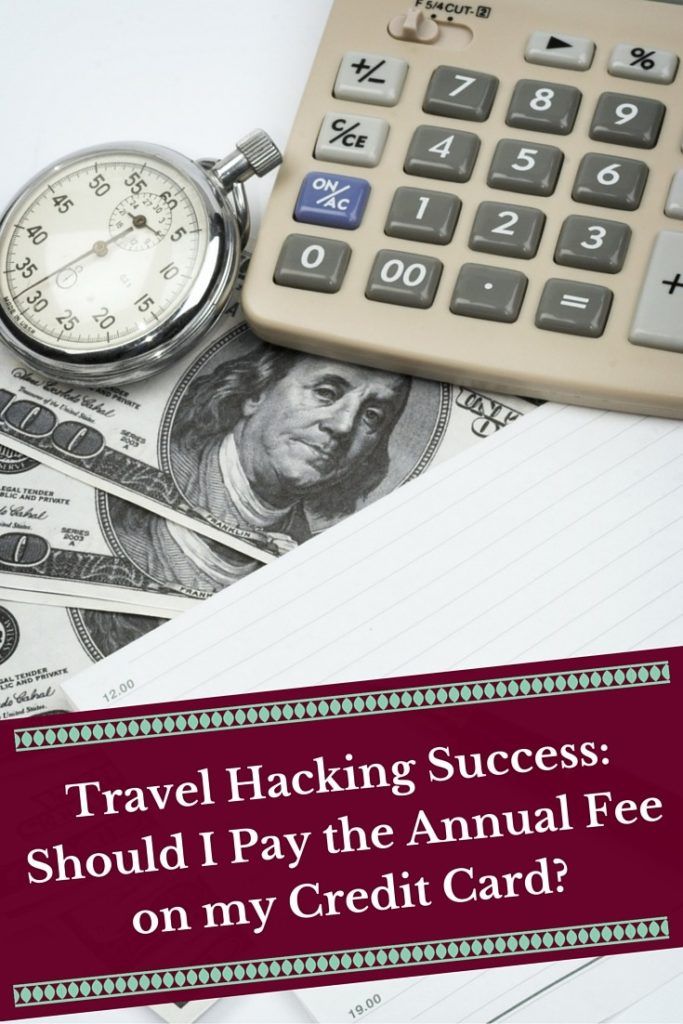Disclosure: The Globetrotting Teacher may receive commission from card issuers. Some or all of the card offers that appear on the The Globetrotting Teacher are from advertisers & may impact how & where cards appear on the site. The Globetrotting Teacher does not include all card companies or all available card offers. Opinions, reviews, analyses & recommendations are the author’s alone, and have not been reviewed, endorsed or approved by any of these entities.
One of the most commonly asked reader and Facebook Group questions is about paying the annual fees on credit cards. This is a typical scenario.
I’ve had a credit card for almost a year and soon I’ll be charged the annual fee. Should I pay it? Can I get the bank to waive the fee again?
Welcome offers on travel rewards credit cards are a key component to accumulating a lot of miles and points for travel in a short amount of time. Many of these cards come with annual fees, some as expensive as $550+!
As part of the welcome offer, banks sometimes waive the annual fee for the first year.

For miles and points enthusiasts, it’s necessary to reevaluate travel rewards credit cards and determine whether or not paying an annual fee is worth it. After doing so, some cards will be worth keeping and others won’t be worth the fee.
Keep in mind, this will be different for each person depending on their travel & spending habits, home airport, and more.
I have plenty of credit cards that I’m fine paying the fee on because I take full advantage of the benefits.
The important thing is to have a process to evaluate each card as you decide whether or not to renew the card for another year.
When should I pay the annual fee?
You might consider paying the annual fee if the credit card benefits outweigh the cost of an annual fee.
For example, in the past, the Chase Hyatt credit card waived the annual fee the first year but cost $95 thereafter.
This card also includes a free night certificate at any category 1-4 Hyatt property every year after renewing the credit card.
Assume you’ll use the free night certificate in a category 4 hotel to gain the highest possible value. There are many Hyatt properties located in expensive cities across Europe, North America, and Asia that regularly book for $200-$400 a night.
Therefore, paying the $95 annual fee on the card is a no-brainer when you make good use of the free night certificate.
Other travel rewards cards offer lounge privileges for you and a couple of guests, statement credits to offset purchases at specific merchants, free checked bags, a $100 credit for Global Entry, and even hundreds of dollars in travel credits to use every time you renew your card.
You must evaluate how well you’re taking advantage of these perks and whether or not their value offsets the annual fee.

You might consider paying the annual fee if the credit card is part of your long-term miles and points earning strategy.
I’m a huge fan of the Chase Sapphire Preferred Card. Earning Chase Ultimate Rewards points is a large piece of how I go about earning award flights. I also use the Chase Sapphire Preferred internationally because it has no transaction fees.
The card gives me 2x the points on travel, a $50 hotel statement credit, and saves me money on car rentals by offering primary car rental insurance. The benefits of the card and the value of the points I’m earning make paying the annual fee more than worth it.
American Express Membership Rewards are also a huge part of my long-term miles and points strategy. Amex only allows you to earn a bonus on a credit card once per lifetime so making use of my American Express Gold card’s bonus categories, Amex Offers, and the benefits that come with the card make the annual fee worth it for me.

Can I get the bank to waive the fee again?
If you’re a good customer who is regularly using the card and paying your bill in full and on time, the bank will not want to lose you as a customer.
You should consider calling the bank and politely explaining you’d like to cancel the card because you don’t feel paying the high annual fee is worth it for you.
Explain that the card’s benefits are no longer bringing you the same value as they were when you applied for the card.
I’ve had annual fees waived simply for being a good customer and asking politely!

The bank may offer you a miles or points bonus instead, or a retention offer, in exchange for you paying the annual fee.
In this case, it’s important to calculate the value of the bonus and compare it with the cost of the annual fee to see whether or not it’s a good deal.
Banks have even offered me both of the above situations at the same time!
I recently called a bank about a credit card and its annual fee. Not only did the agent waive the annual fee, but also gave me an incentive to use the card by offering 5k bonus American Airlines miles for spending $1k within 90 days.
This was a win-win proposition! So, I will keep the card and reassess it next year.

In addition, by keeping the card open another year, I add to the length of time my account has been open, which will only benefit my credit score in the long run.
ProTip: It’s important to remember the potential power of calling back. If the agent I spoke with initially had not been helpful. I was prepared to call back and speak with a different agent to see if I could get the annual fee waived.
Does keeping the card open make sense for my points & miles strategy?
Every bank has its own rules about credit card applications and how many times it’s possible to earn a bonus for a particular card.
In some cases, you might want or need to close a credit card in order to earn the bonus on that card again in the future.
For example, Chase allows you to earn a bonus again on many of their cards if it’s been more than 24 months since you’ve earned that card’s bonus.
Some banks group cards into families and won’t allow you to get other cards in that same “family” if you currently hold another one in the “family.”
In these cases, it makes sense to close the card, as opposed to asking the bank to waive the fee again.
What if the bank will not waive the fee or offer a retention bonus?
Sometimes banks are unwilling to waive the annual fee or offer a retention bonus.

In this case, you could ask the bank to downgrade the card to one with no fee.
Downgrading a card is a better option for your credit score rather than canceling a card outright. Doing so preserves the line of credit and allows you to continue adding to the age of your accounts.
Sometimes, though, there is no downgrade option.
If you have another credit card with the same bank, ask the phone representative to move the line of credit on the card you’re closing to another one of your cards with that bank.
Not only is this helpful for keeping your debt-to-credit ratio stable, but it could also be useful for future applications.
For example, if a bank is concerned about extending too much credit to you for a new card in the future, some of your current line(s) of credit could be reallocated to fund that new card.
In this case, the bank wouldn’t be extending you any more credit than you already had available.
Also, consider your miles and points earned with the card you’re about to cancel.
Flexible/transferable points or miles currently in your account could be lost if you don’t have another card that earns that same flexible currency.
For example, if you have a Chase Sapphire Preferred but no other Ultimate Rewards earning card, you’ll lose whatever points you’ve earned. In this case, it’s best to transfer them to an airline or hotel transfer partner to use for future travel.
If you are closing a co-branded card airline or hotel card, like the Hilton Surpass or AA Citi Platinum Select, the good news is these miles and points are in that respective loyalty program account, and not connected with the bank that issues the card.
Therefore, you can safely close these cards and not fear losing the miles and points in these airline and hotel accounts.
Remember, some banks, like American Express, only allow you a particular card’s welcome bonus once.
Be sure the credit card is worth canceling because you may not be able to get the welcome offer on that card again.

Also, remember, if you’re planning to apply for new credit cards, you should do this before you cancel any card.
When you close cards, your credit score will go down temporarily because the overall age of your accounts usually gets younger. However, if you open a new card first, you’ll also have more available credit extended to you overall which can improve your credit score.
What questions do you have about whether or not you should pay the annual fee on your card?
Like this post? Please share it on social media using the share buttons below!




